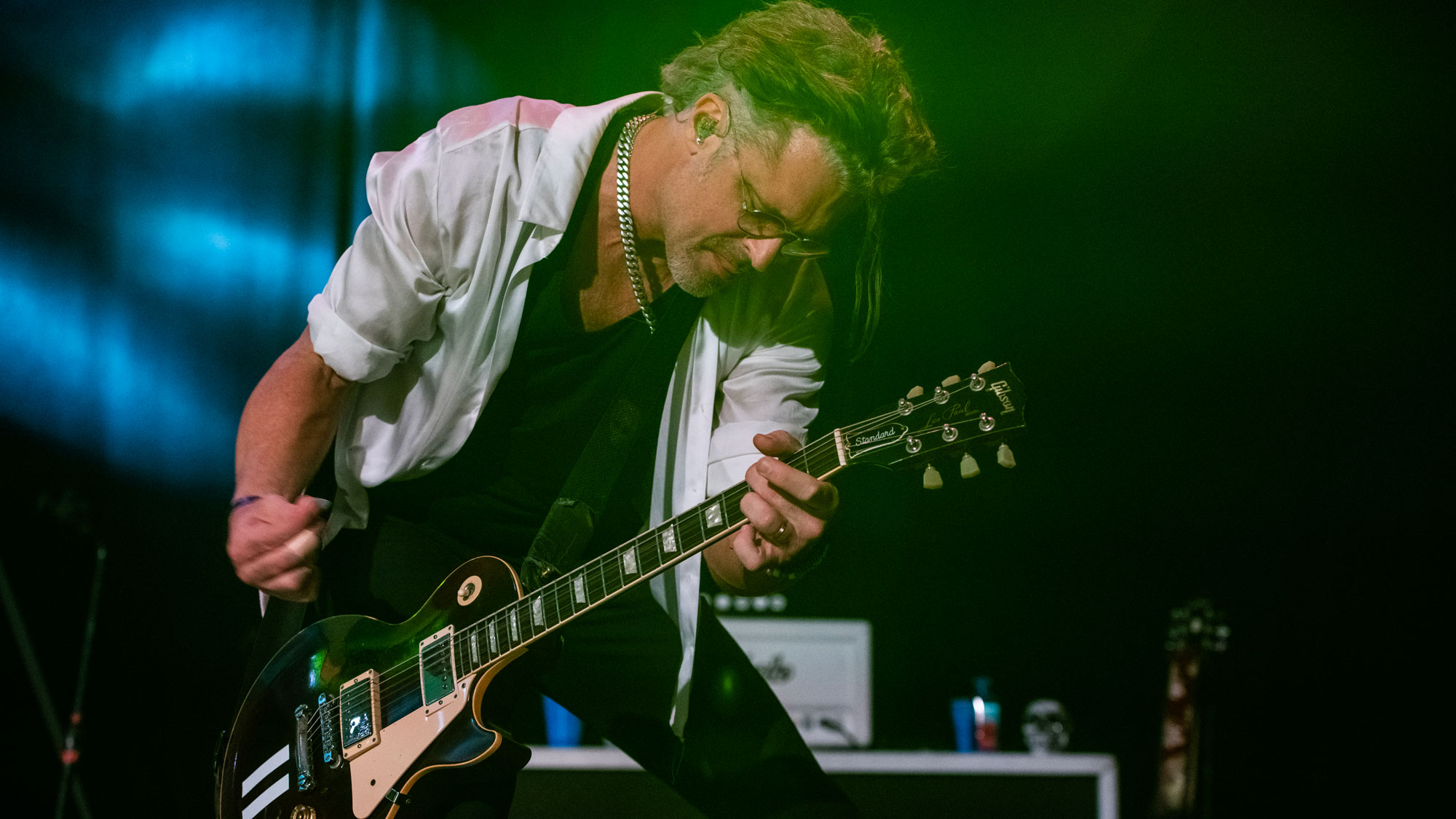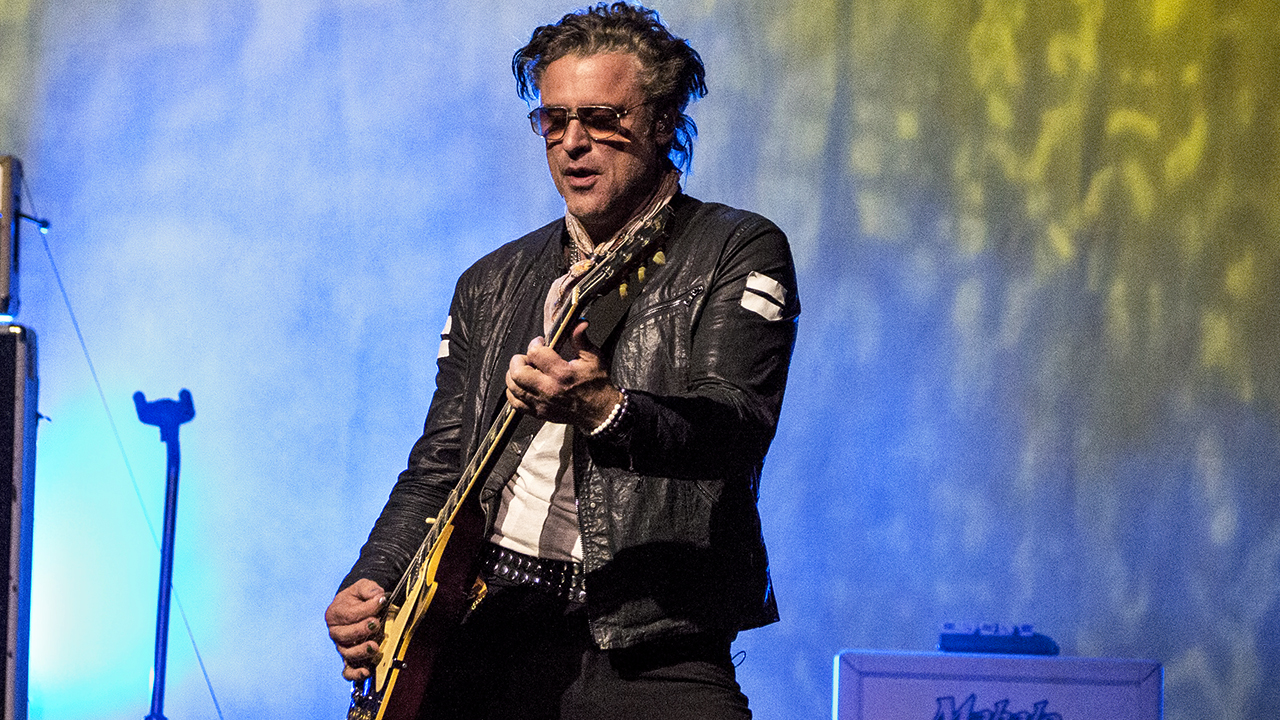“That Les Paul became my thing. Its neck has broken three different times! That’s why I call it my workhorse – it just keeps going”: Collective Soul’s Dean Roland on his long-serving gear – and why he’s never rested on the band’s ’90s success
One half of the Roland siblings explains why Collective Soul’s new double-album is the continuation of a long-running theme, reinforced by lessons learned while touring with Aerosmith

Since Collective Soul got started, Georgia-born brothers Ed and Dean Roland have held it down, delivering hits like Shine, December and The World I Know, and performing iconic sets at Woodstock ’94 and ’99.
The band have released 11 studio records labeled everything from grunge to alt to – gasp – classic rock. But rhythm guitarist Dean Roland believes it doesn’t matter much. “It’s always been about melody, honest lyrics and having some fun sounds around it,” he tells Guitar World.
“We’ve never put ourselves under too much pressure on beyond that. I feel like that’s enough. We’ve never chased any current trends; if it doesn’t feel authentic and you’re not feeling it yourself, how can anyone else?”
Any artist who’s been through the wringer of the musician business can relate. “If you want to maintain a career and make the most of the opportunity that's been given, you've got to keep going,” Roland says.
“We just push through. We have our own kind of work ethic and tenacity. Long story short: it’s not a job if it doesn’t feel like one. We just feel like we’ve always been out there loving what we do.”
It would be all too easy for Collective Soul to rely on their hits – but the Roland brothers have just rolled out their 12th record, Here to Eternity. What’s cool is they tracked it in Elvis Presley’s mansion in California, dubbed Graceland West; but what's even cooler is Roland’s outlook on life.
“Try to find that grounded, authentic self who you think you are,” he says. “Then maintain humble confidence, and just go work and enjoy it. If you’re being driven by that purpose, all you have to do is keep on going until that flame burns out.”
Get The Pick Newsletter
All the latest guitar news, interviews, lessons, reviews, deals and more, direct to your inbox!
What gear inspired you most as you made the new album?
“Honestly, we keep it wide open. We’ve all collected our own gear over the years. Very often I use my Gretsch guitars, and my Les Paul that I've had for almost 30 years. It’s really my main workhorse. I play the Les Paul live and in the studio as well.
“Other than that, we kind of float around and serve the song’s vibe. We know what the song is calling for – if it’s Teles or Strats, there’s not too much prejudgment. It’s just about seeing what feels right.”
So you probably approach your riffs off the cuff?
“Yeah – most of this record was kind of off the cuff. Some of the general forms were there when Ed brought them in; then you sit down and start to fill out what works within that.
“Jesse Triplett plays most, if not all, the leads, so he and I are bouncing back and forth between what kind of underlying rhythm thing I’m doing and what he’s putting on top, and that relates to the melody.”
How did you come by your Les Paul workhorse?
“Around ’94 or ’95, we were playing a show in New York City, and a new Gibson rep gave me a couple to try. That one stuck. It became my thing. That guitar’s neck has broken like three different times!
“That’s why I call it my workhorse; it just keeps going. But I think I’m at a place now where it might be time to call it a day. Maybe, you know, I’ll retire it, just put it on the stand and let it sit at home. I think it’s done it’s work.”
People started writing about us and calling us ‘grunge lite,’ whatever that even is!
What’s your rig like?
“It’s pretty simple. I’ll work with some different things, but my main role is rhythm, playing riffy stuff – just laying it down and putting it in a groove, then Jesse will put all his fun melodies, sounds, and effects on top of that thing.
“So I keep my rig simple, going through a couple of pedals here and there and whatever effects are added during the mixing process. And I play Mahalo Amps.”
Mahalo Amps is an interesting choice.
“I met Scott Phillips, one of the company's founders, many years back. I’ve played a lot of different amps over the years, like Budda and Orange, but the Mahalos gave me something that I really kind of dug into. It felt good.
“My role is not to overstep, and kind of glue it together, so to speak. So I just fell into it with those amps; I've been playing Mahalo for over 10 years now.”
What are the biggest differences between recording now and when you were doing the early albums?
“Our first couple of records were recorded to 16-track tape for bass and drums – the basic tracks. It was the early days of Pro Tools, so we were trying to figure out how to utilize that in a way that wasn’t overstepping. We’d record live as much as possible. Over the years, we got into records where we weren't even in the same place at the same time.
“But as we’ve continued to tour and play live a lot, the chemistry of the band just felt great. There’s still this natural thing to want to get in there, and create in the same room together, and have whatever the urgency of that propels us to do. So we’ve kind of morphed back to that.”
At this stage of the game, a lot of older bands lay back and don’t bother doing making new music.
“We’ve always taken the approach of being grateful for being given the opportunity to make music for a living. We were so appreciative of the mainstream success we had in the ‘90s and being a part of that – whatever that was.
“But we’ve never really wanted to take a step back and celebrate whatever success we’ve had. We really have taken that approach of, ‘What’s next? Let’s keep going.’”
Brad Whitford is an exceptional and underrated guitar player
Your fans seem to have embraced that – they see you as more than just a ‘90s grunge-type band.
“We had a lot of that, but that was just through the association of having success at that time. People started writing about us and calling us ‘grunge lite’, whatever that even is! Elton John is one of our biggest, if not the biggest, influence, and the Beatles, too.”
One tidbit from that era that gets overlooked is that Collective Soul opened for Aerosmith on the Get a Grip tour.
“I was 21 at the time, and we’d just been playing in clubs and figuring out what we were doing. Ed had been going at it for quite some time, so there was a lot of work leading up to our initial success. But when it did happen, it happened super-fast.
“We went from playing in our hometown in Atlanta, Georgia, in small clubs, to selling out venues on our own within four or five months to doing the tour with Aerosmith.”
Did you manage to grab any pointers from Brad Whitford or Joe Perry?
“What I took away most was the humble, professional way they handled themselves – they were just fucking cool. Those cats were just there with open arms. Especially Brad; he’s an exceptional and underrated guitar player, by the way.
“What I took away from him was how to be successful, how to handle it and how to carry yourself. Aerosmith have always been great; they’ve had their ups and downs, but that was a massive time for them. They were just good people, and I really did take that away.”

It was a massive time for Collective Soul, too – what sticks out most when you look back on putting those songs together?
“Shine was on the first album [Hints, Allegations and Things Left Unsaid], which was a collection of demos. There were some band songs and some songs that Ed had done virtually by himself. Even Shine was played on a drum machine that Ed played.
On the first tour we were playing songs that were being written… we were literally hashing it out on stage in front of people
“All that stuff was just a mishmash with the intention of getting a record deal and then going in and making what essentially became the second record [Collective Soul] with The World I Know.”
Did the success of the debut catch you off guard?
“Yeah! Shine started getting played on college radio stations in Atlanta first, and then on mainstream commercial radio stations. We were like, ‘Oh, shit!’ It’s getting bigger and out of our control, and the label didn’t want us to go back and re-record – they were just like, ‘Sign a deal. We’re just going to run this thing out.’
“On the first tour we were playing songs that were being written; we were just figuring them out. We were literally hashing it out on stage in front of people. So, my takeaway from that ’94 to ’95 era is that you’ve got to keep going.”
Are there any tracks from Here to Eternity that stand up to the classics?
“That’s the million-dollar question! I love Bluer Than So Blue and I love Not the Same. I went back and listened as we were getting ready for the release. It’s a really good record; there’s some depth to it that we can all take pride in.
“We didn’t go into this thinking we were going to do a double record. We’d kind of talked about it – like, ‘It’d be cool if we could pull that off’ – but it was never the full intention. We had that creative spark and momentum. Ed kept writing songs, so we just kept recording them.”
- From Here to Eternity is out now.
Andrew Daly is an iced-coffee-addicted, oddball Telecaster-playing, alfredo pasta-loving journalist from Long Island, NY, who, in addition to being a contributing writer for Guitar World, scribes for Bass Player, Guitar Player, Guitarist, and MusicRadar. Andrew has interviewed favorites like Ace Frehley, Johnny Marr, Vito Bratta, Bruce Kulick, Joe Perry, Brad Whitford, Tom Morello, Rich Robinson, and Paul Stanley, while his all-time favorite (rhythm player), Keith Richards, continues to elude him.
“Our answer to everything players have asked for and more”: Neural DSP’s Nano Cortex had one major drawback – but now it’s been addressed with a huge free firmware update that takes on Kemper and TONEX
“One of the most genuinely unique guitar tones I’ve ever heard”: Submarine Pickups Subsix review









![[from left] George Harrison with his Gretsch Country Gentleman, Norman Harris of Norman's Rare Guitars holds a gold-top Les Paul, John Fogerty with his legendary 1969 Rickenbacker](https://cdn.mos.cms.futurecdn.net/TuH3nuhn9etqjdn5sy4ntW.jpg)







